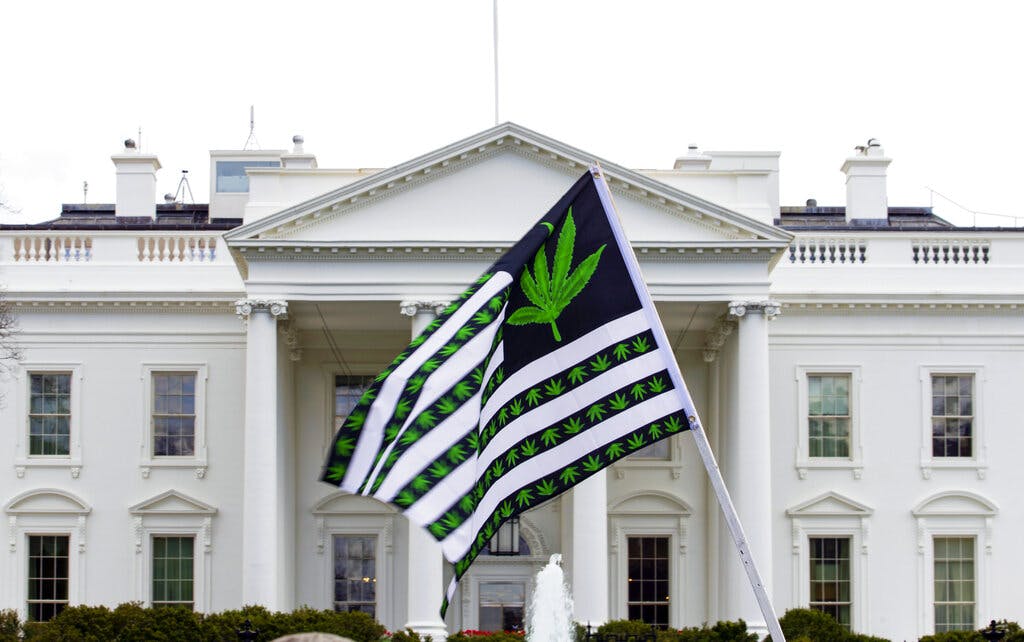Biden’s Marijuana Pardons Are Baby Steps, Falling Far Short of Real Reform of America’s Drug Laws
That’s how it looks from Libertarian Land.

On October 6, President Biden announced a pardon of prior Federal offenses for simple possession of marijuana, urging all governors to follow suit for state offenses. Mr. Biden also asked the Secretary of the Department of Health and Human Services to “initiate the administrative process to review expeditiously how marijuana is scheduled under Federal law.”
Are these reasonable steps toward marijuana legalization? Perhaps. Are these major steps toward better American drug policy overall? Not even close.
The Biden pardon affects about 6,500 people, but zero existing prisoners. The pardon applies only to federal convictions, which constitute a modest fraction of all marijuana convictions; and only to simple possession offenses, which are a small fraction of total marijuana offenses. Pardons are presumably welcome to those receiving them, but they fall short of expungement, meaning pardoned individuals still have a criminal record.
The request that Health and Human Services reclassify marijuana to Schedule II from Schedule I of the 1970 Controlled Substances Act is a potentially bigger step. Schedule I, which includes heroin and LSD, contains “drugs with no currently accepted medical use and a high potential for abuse.” Doctors cannot prescribe Schedule I drugs, which is why many still hesitate to prescribe despite state medicalizations or legalizations.
Schedule II, which includes cocaine, morphine, and fentanyl. contains drugs with a “high potential for abuse, with use potentially leading to severe psychological or physical dependence.” Doctors can legally prescribe Schedule II drugs, subject to federal regulation and oversight.
In principle, rescheduling could amount to de facto legalization. Marijuana appears to be a useful treatment for numerous conditions, including stress, pain, and the nausea caused by chemotherapy; state-level medical data suggest some doctors will prescribe freely, so long as they do not fear federal oversight.
Yet the rescheduling process will likely take years, and the Drug Enforcement Administration might still keep marijuana in Schedule I. In 1988, a DEA administrative law judge, Francis Young, ruled in response to a petition from the National Organization for Reform of Marijuana Laws that marijuana be rescheduled, yet the DEA administrator, John Lawn, refused, with appeals of Mr. Lawn’s decision, and later rescheduling petitions, suffering a similar fate.
Even if marijuana were in Schedule II, federal oversight might still make it difficult for doctors to prescribe. Schedule II allows the DEA to monitor physician prescribing and impose financial and criminal penalties for “excessive” prescribing.
This is what the DEA has done regarding opioids: it prosecutes doctors who, in their view, prescribe excessively. This encourages purchase of illicit opioids, which are often laced with fentanyl and therefore more likely to cause overdoses.
The rescheduling approach is also fragile because a future administration can reverse any decision to reschedule marijuana, or interpret and enforce the rescheduling in ways that make it meaningless.
So, regarding marijuana, Mr. Biden’s measures are baby steps. An even greater problem is that the President’s actions do nothing about American prohibitions of cocaine, opioids, psychedelics, and numerous other drugs (as the Economist has noted recently regarding cocaine).
More than a century of experience demonstrates that prohibition is a treatment far worse than the “disease” it purports to cure. Prohibition creates violence because participants cannot resolve their disagreements with courts or arbitration and resort to violence instead.
Prohibition encourages corruption by preventing above-board mechanisms (lawsuits, regulation, ballot initiatives) for resolving debates about policies and enforcement. Prohibition makes drugs far more dangerous because normal quality control mechanisms are not available in underground markets (hence the opioid crisis).
Prohibition also infringes civil liberties via stop-and-frisk or no-knock warrants, exacerbates racial tensions given uneven enforcement, restricts medical use of marijuana, opioids, and psychedelics, and exports many of these ills to countries that supply the drugs feeding America’s consumption.
Despite the substantial resources devoted to enforcement, moreover, prohibition appears to reduce use only modestly. True reform of drug policy must recognize that governments should never have prohibited drugs in the first place; they should immediately re-legalize all drugs.
The risk from President Biden’s baby steps, even if welcome in and of themselves, is that they feel good and sound like progress but mainly crowd out discussion of the more fundamental issue: Who decides whether individuals can use or sell drugs? In Libertarian Land, the answer is clear.

